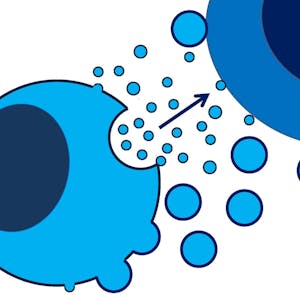Basics of Extracellular Vesicles
About this Course
This course aims to provide the basic knowledge about extracellular vesicles (EV) a generic term including exosomes, microvesicles, microparticles, ectosomes, oncosomes, prostasomes, and many others. It covers areas such as EV history, nomenclature, biogenesis, EV cargo as well as the release and uptake mechanisms, collection and processing prior to isolation, different isolation methods, characterization and quantification techniques. This course is divided into five modules. Module 1 is an introduction to the field and will cover the nomenclature and the history of EVs. Module 2 will focus on the biogenesis, release and uptake mechanisms of EVs as well as the different EV cargos (RNA, protein, lipids). In Module 3, we will focus on the collection and processing of cell culture media and body fluids such as blood, breast milk, cerebrospinal fluid and urine prior to isolation of EVs. Module 4 and 5 will present different isolation methods and characterization/quantification techniques, respectively. Here differential ultracentrifugation, size exclusion chromatography, density gradient, kit based precipitation, electron microscopy (EM), cryo-TEM, flow cytometry, atomic-force microscopy and nanoparticle tracking analysis will be presented. The recommended prerequisites are college-freshman-level biology and biochemistry. After a completed course you should be able to: + Discuss the nomenclature and subgroups of extracellular vesicles. + Describe the RNA, protein and lipid content of extracellular vesicles. + Describe the basic concepts about the most common isolation and characterization techniques and how these techniques are used in the EV field. + State the benefits and limitations of the most common isolation and characterization techniques for extracellular vesicles. + Explain the considerations that are important during the collection and isolation of EVs from different body fluid. + Describe the release and uptake mechanisms of extracellular vesicles All lectures are given in English. Each of the five modules will be followed by an exam. All exams will be in the format of multiple choice questions. The course is organized in collaboration between the International Society for Extracellular Vesicles (ISEV), University of California Irvine (USA), University of Gothenburg (Sweden) and Pohang University of Science and Technology (South Korea).Created by: University of California, Irvine

Related Online Courses
In this 2 hour long project you will create a SCRUM project in Jira, exploring the SCRUM agile methodology and familiarizing with all of its elements. You will create user stories and tasks, plan... more
Generative AI is rapidly reshaping industries and the skills that students are going to be expected to have to be employable. As the pace of technological change accelerates, universities must... more
This is a self-paced lab that takes place in the Google Cloud console. In this hands-on lab you will learn how to connect to computing resources hosted on Google Cloud Platform via the web. You... more
This Kubernetes Security Specialist course offers foundational knowledge through concepts and hands-on demonstrations of securing a Kubernetes cluster and its applications. Emphasizing practical... more
The ability to influence without force or coercion is important in any organization and at all levels. Modern managers must master the art of persuasive communication, adapt to the needs of the... more








